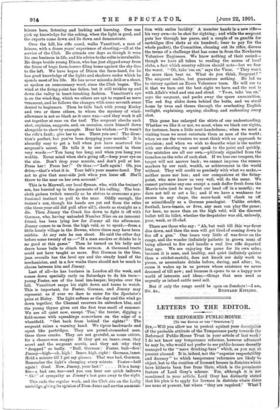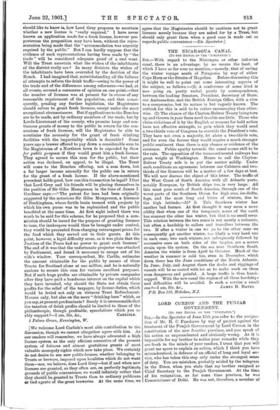LETTERS TO THE EDITOR.
THE REFORMED PUBLICATOUSE. . . . . .
[TO TN2 EDITOR OD THE "SPECTATOR."]
you allow- me to. protest against your description Of the probable attitude of the Temperance party towards the Reformed. Public-House Trust in your article of .last *eek ? I-do -not! know any temperance reformer, however advanced be May be, Who tvottld not prefer to see inblic-houses decently managed to the -"more drinking bars " wliich, as you say at present abound: It-is, indeed, not the "superior respectability and decency" 'to which temperance reformersare likely to object, but to.the creation of licensed houses in districtswinch have hitherto been free from them; Which is the prominent feature of Lord Grey's icheme._ For, although it 1 is not mentioned in your article, Lord Grey haa distinctly stated that his plan is to apply for licenses in districts where there are none at present, but where " therare required.!' WhatI should like to know is, how Lord Grey proposes to ascertain whether a new license is "really required." I have never known an application -made for a fresh license, however pre- posterous the proposition may have been, without the repre- sentation being made that the "accommodation was urgently required by the public." But I can hardly suppose that the evidence of such representations having been made by "the trade" will be considered adequate proof of a real want. Will the Trust ascertain what the wishes of the inhabitants of the district really are ? In many districts the wishes of the inhabitants have been overruled by the decision of the Bench. I had imagined that, notwithstanding all the failures of attempts to reform the drink traffic—owing to the power of the trade and of the differences among reformers—we had, at all events, secured a consensus of opinion on one point,—that the number of licenses was at present far in excess of any reasonable requirement of the population, and that conse- quently, pending any further legislation, the Magistrates should refuse to grant fresh licenses, except under the moat exceptional circumstances. But if applications to the Benches are to be made, not by ordinary members of the trade, but by Lords-Lieutenant of the county, who promise large and con- tinuous grants of money to the public in return for the con- cessions of fresh licenses, will the Magistrates be able to scrutinise the necessity for the grant of fresh drinking facilities with the impartiality which is desirable ? Some years ago a brewer offered to pay down a considerable sum to the Magistrates of a Northern town to be expended by them for public purposes if they would grant him a fresh license. They agreed to secure this sum for the public, but their action was declared, on appeal, to be illegal. The Trust will come to the Benches offering, not a sum down, but a far larger income annually for the public use in return for the grant of a fresh license. If the above-mentioned precedent holds good, how can this transaction be legal? I fear that Lord Grey and his friends will be placing themselves in the position of Sir Giles Mompesson in the time of James I. Gardiner says:—" The patent for inns had been originally suggested by the notorious Sir Giles Mompesson, a kinsman of Buckingham, whose fertile brain teemed with projects by which his own purse was to be replenished and the public benefited at the same time. At first sight indeed there was much to be said for this scheme, for he proposed that a com- mission should be issued for the purpose of granting licenses to inns, the innkeepers would thus be brought under control, they would be preyented from charging extravagant prices for the food which they served out to their guests. At this point, however, a legal difficulty arose, as it was plain that the Justices of the Peace had no power to grant such licenses." The end of it was that the unfortunate projector was attacked by Parliament, and found it necessary to escape out of his wife's window. Your correspondent, Mr. Carlile, estimates the amount obtainable for the public by means of these Trusts for Scotland alone at one million, and he is naturally anxious to secure this sum for various excellent purposes. But if such huge profits are obtainable by private companies after they have paid a handsome interest on the capital which they have invested, why should the State not obtain these profits for the relief of the taxpayer, by license-duties, which would be levied not only on virtuous Trust Refreshment- Houses only, but also on the mere "drinking-bars" which, as you say, at present predominate? Surely it is unreasonable that the taxation of drink profits should be limited to those of the philanthropic, though profitable, speculations which you so ably support P—I am, Sir, &c., CA.BLISLE. 1 Palace Green, Kensington, W.
[We welcome Lord Carlisle's most able contribution to the discussion, though we cannot altogether agree with him. As our readers will remember, we have always advocated a high license system as the only efficient corrective of the present system of fatuous and almost -gratuitous grants of most valuable monopoly rights which now take place. We certainly do not desire to see new public-houses, whether belonging to Trusts or brewers, imposed upon localities which do not want them—nor, we believe, does Lord Grey—but if and when new licenses are granted, as they often are, on perfectly legitimate grounds of public convenience, we would infinitely rather that they should be granted to Trusts than to ordinary publicans Or tied agents of the great breweries. At the same time, we
agree that the Magistrates should be cautious not to grant licenses merely because they are asked for by a Trust, but should only grant them when a good case is made out as regards public convenience—ED. Spectator.]











































 Previous page
Previous page